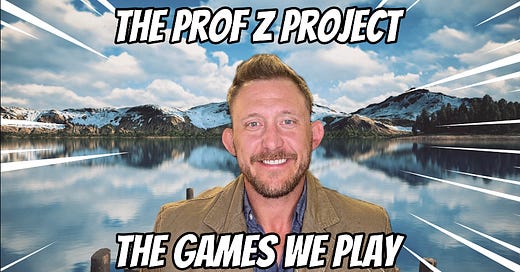Experts know the rules. Masters know which ones to break.
Rules exist because of the games we play. We play the game of living in a civil society. We play the game of creating value for others. And typically, the more value you create, the more fame, status, wealth, or power you accumulate—just like we explored last week in The Chase.
But do you even know which game you are playing?
We play these games so we can stop playing—or switch to a better one. You play the game of college to get a degree and graduate into something new. Some people are so good at that game, they keep playing—getting advanced degrees or becoming professors.
Entrepreneurs play the game of creating value and building wealth. They might start small and create a bigger impact over time. Eventually, the people who create enough power become the ones who rewrite the rules.
So, what game are you playing? And who made the rules?
The Oldest Game: Status
The original human game wasn’t building wealth—it was building status.
Before we had bank accounts or Bitcoin, our ancestors competed for standing in the tribe. Status meant survival. The higher your standing, the better your chances for food, protection, and influence. If you didn’t create value for the tribe—or signal that value—you were expendable.
Fast forward a few millennia, and we’re still playing the same game. The clothes, the cars we drive, the job titles, the social media posts—it’s all signaling. The chase for status is an ancient instinct.
“Much of what we consume today is purchased not for its intrinsic value, but for what it tells others about us.” — Robert H. Frank, Luxury Fever
We pretend we’re chasing success, but many of us are really chasing status.
The Success Trap
Success takes time. It’s often a long, compounding journey built on discipline and experience.
But here’s the trap: we believe if we delay happiness long enough, we’ll earn it later—as if happiness were some deferred dividend on a success portfolio.
So we grind. We sacrifice joy and happiness now for a vision of success later, which hopefully brings joy and happiness. But what if that vision isn’t even yours? Are you unhappy because you’re not successful? Or are you unhappy because you’re chasing someone else’s version of success?
In The Alchemist, Santiago crosses deserts and continents chasing treasure he thinks lies beneath the pyramids. Spoiler: it isn’t there. The treasure he actually was seeking was back home all along. But he had to go on the journey to discover that truth.
Like Santiago, most of us start by chasing what the world tells us matters—riches, glory, approval. But the real prize isn’t the treasure. It’s clarity. Freedom. Creating your Personal Legend.
“Everyone seems to have a clear idea of how other people should lead their lives, but none about his or her own.” — The Alchemist, Paulo Coelho
The Move from Expert to Master
So how do you escape the trap? You stop trying to win the game you were handed. You decide whether it’s even a game worth playing.
Experts follow the rules. Masters know the limits and decide which ones are worth breaking.
Jimi Hendrix didn’t play the guitar the “right” way—he played it his way. Distortion, feedback, upside down. He broke most traditional music structure, and it changed music forever. In fact, Eric Clapton walked away from a Jimi Hendrix show discouraged because he knew he could not do what Jimi did on the guitar.
Bruce Lee didn’t stick to one martial art. He created his own—Jeet Kune Do—by fusing what worked from multiple martial arts and discarding what didn’t. This was very unconvential at the time. That rebellion from traditional martial arts is now the norm in Mixed Martial Arts (MMA).
Banksy became one of the world’s most influential artists not by selling his work to galleries—but by spray-painting alleys and walls. He used the streets as his canvas, art as the message, and anonymity as his brand.
These innovators aren’t rebels for rebellion’s sake. They were masters of their craft who understand the rules—and exactly which ones to break.
So, What Game Are You Playing?
You can’t know what rules to follow—or which to break—unless you know what game you’re playing.
Ask yourself:
What game am I actually playing?
Why do I believe it matters?
What am I really chasing?
There’s no one-size-fits-all playbook for success. The game is different for everyone. And the win condition? That’s up to you.
Just make sure you’re not chasing something you may already have.
Connect with Zach
Website • Twitter • LinkedIn • Youtube





